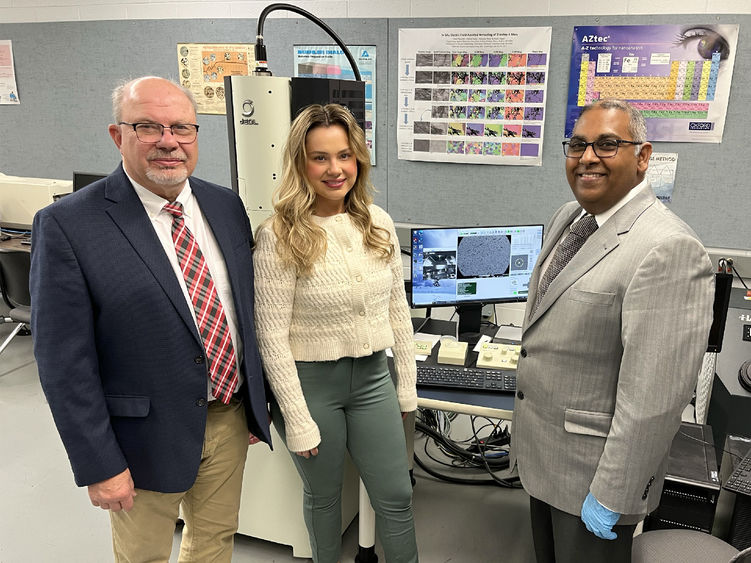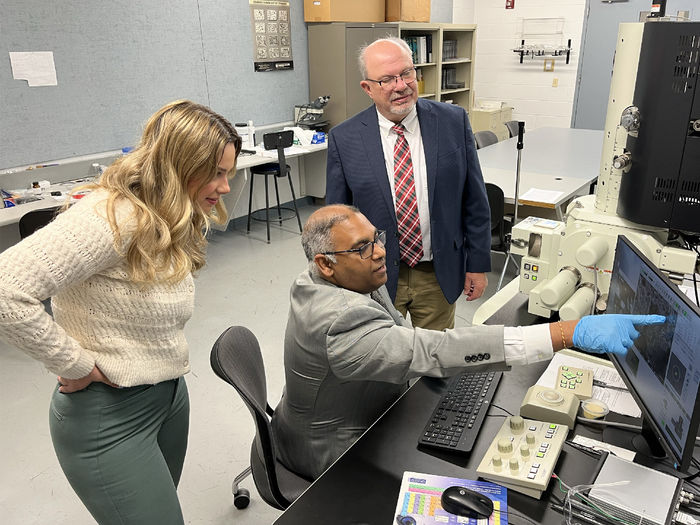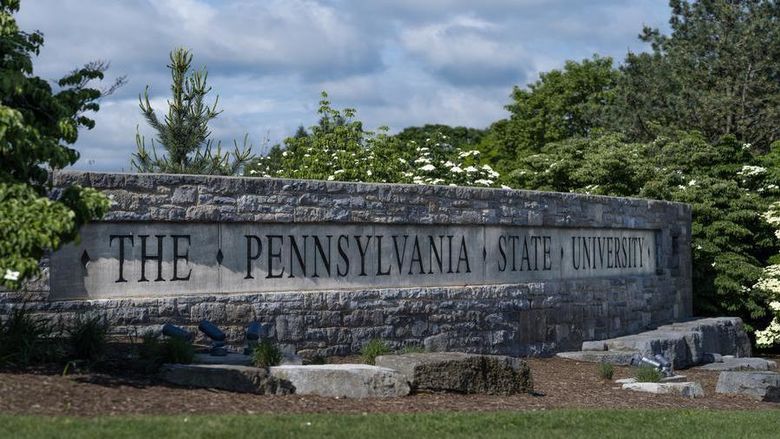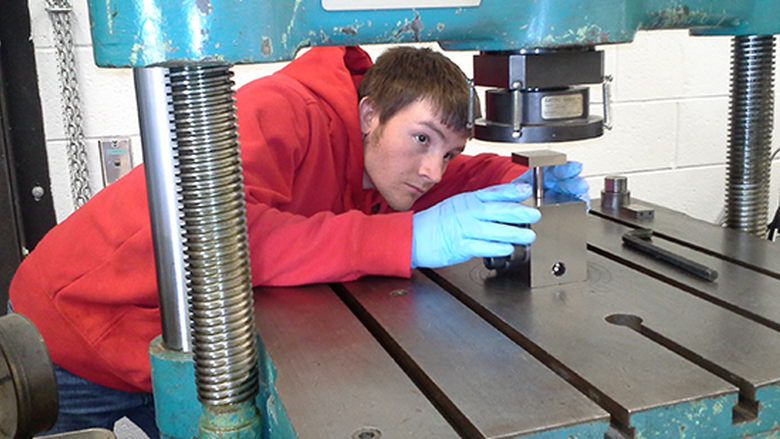
Ramakrishnan Rajagopalan, professor of engineering at Penn State DuBois, right, stands next to Tony Zaffuto, president of Metaltech, left, and Bethany Zaffuto, marketing lead for Metaltech, center, in one of the engineering labs at Penn State DuBois.
DuBOIS, Pa. — Penn State DuBois and Metaltech Inc., a local leader in powdered metal manufacturing, are teaming up on a new research initiative focused on next-generation energy storage. Backed by a $70,000 grant from the 2025 Manufacturing PA Innovation Program, the project aims to develop sponge iron electrodes for use in iron-air batteries by repurposing mill scale, a byproduct of steelmaking.
The collaborative effort, titled “Manufacture of Sponge Iron Electrodes from Mill Scale Iron for Use in Iron-Air Batteries,” brings together faculty and students from Penn State DuBois and engineering staff from Metaltech Inc., headquartered in DuBois.
Iron-air batteries, which use iron as the negative electrode paired with an air-based positive electrode in an alkaline electrolyte, are emerging as a cost-effective and environmentally friendly option for large-scale energy storage. During charging and discharging, iron undergoes a reversible reaction with oxygen, enabling these batteries to deliver more energy while avoiding issues like dendrite formation — metal offshoots that can cause the battery to short circuit or fail — that affect other battery types.
The project will focus on creating sponge iron electrodes from mill scale, a steelmaking byproduct that typically contains about 70% iron along with iron oxides and contaminants like oils and lubricants. Traditionally considered a waste product that producers must pay for disposal of, mill scale can be converted into high-purity sponge iron using a direct reduction process, which removes oxygen from iron oxides at high temperatures to form a porous, honeycombed microstructure ideal for battery electrodes.
“Recycling mill scale into sponge iron for battery electrodes not only addresses an environmental challenge but also adds value to a waste product,” said Ramakrishnan “Ram” Rajagopalan, professor of engineering at Penn State DuBois, who is leading the research on campus. “This project gives our students hands-on experience with advanced manufacturing and energy storage solutions.”
Metaltech Inc. uses a hydrogen-based reduction process to produce sponge iron, which offers advantages such as lower energy consumption and higher product quality while using cleaner fuel sources. The sponge iron powder produced will be characterized using advanced techniques including scanning electron microscopy, X-ray diffraction, and particle size analysis to ensure consistency and performance.
The team will fabricate electrodes with the addition of additives that suppress electrode passivation and hydrogen evolution during battery cycling, with the goal of improving efficiency and lifespan.
“The early lab tests using cyclic voltammetry have shown promising redox activity for the sponge iron derived from mill scale,” Rajagopalan said. Cyclic voltammetry is a technique that allows scientists to examine how many electrons are transferred during a chemical reaction, a process referred to as redox activity. “It’s exciting to see potential for real-world application in energy storage.”
Metaltech Inc., which has produced pressed metal parts for more than 30 years, serves the automotive, industrial, and lawn and garden markets, and has recently expanded into power transmission and alternative energy. Bethany Zaffuto, who leads marketing at Metaltech, has helped connect the company with battery developers and advance the partnership with Penn State DuBois.
“We brought the idea to Ram and worked together to build the proposal,” said Tony Zaffuto, founder and president of Metaltech Inc. “Having access to experienced faculty and students right here in our region is a huge advantage.”
The Manufacturing PA Innovation Program, administered by the Pennsylvania Department of Community and Economic Development, is funding 42 projects in 2025 to support innovation and workforce development across the commonwealth. This marks the fourth time Penn State DuBois has received funding through the program.
“We extend our warmest congratulations to Professor Rajagopalan and our esteemed industry partner, Metaltech Inc., for securing funding from the Manufacturing PA Innovation Program,” said Jungwoo Ryoo, chancellor and chief academic officer at Penn State DuBois. “This grant is a direct reflection of Professor Rajagopalan's unwavering commitment to applying his research expertise to benefit our local community. It will provide invaluable hands-on experience for students and undoubtedly make a significant positive impact on the local powder metal industry, empowering it with the innovations needed to thrive in an ever-evolving global landscape.”
The collaborative project commenced in June, with periodic evaluations planned to monitor progress, share findings and inform the next phases of development as the team works toward advancing iron-air battery technology for grid-scale energy storage.




